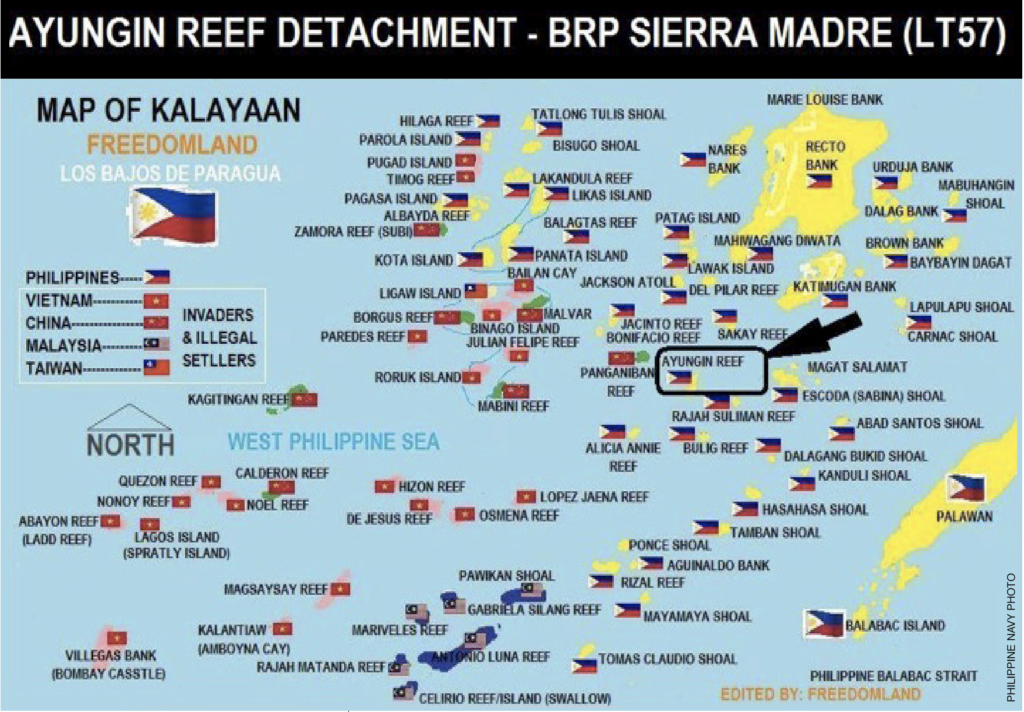On Nov. 18, 2021, the Philippine Department of Foreign Affairs issued a strong statement condemning the actions of three Chinese Coast Guard (CCG) vessels for blocking and water cannoning two Philippine vessels en route to Second Thomas Shoal to pursue their routine resupply missions. Even President Rodrigo R. Duterte issued a very strong statement during the China-ASEAN Special Meeting on Nov. 22, 2021 stressing, “We abhor the recent event.”
By Rommel C. Banlaoi, PhD

Though the Philippines and China committed to pursue comprehensive strategic cooperation in the 21st century under the leaderships of President Rodrigo R. Duterte and President Xi Jinping, persistent territorial disputes and maritime jurisdictional conflicts in the South China Sea continue to disrupt their efforts towards better bilateral ties.
The recent incident in the Second Thomas Shoal (Ayungin Shoal for the Philippines and Ren’ai Jiao for China) was another example on how territorial and maritime disputes could damage good bilateral relations built through years of consultations.
On Nov. 18, 2021, the Philippine Department of Foreign Affairs issued a strong statement condemning the actions of three Chinese Coast Guard (CCG) vessels for blocking and water cannoning two Philippine vessels en route to Second Thomas Shoal to pursue their routine resupply missions. Even President Rodrigo R. Duterte issued a very strong statement during the China-ASEAN Special Meeting on Nov. 22, 2021 stressing, “We abhor the recent event.”
This unfortunate incident occurred on Nov. 16, 2021 in an area regarded by the Philippine government as an integral part of its Exclusive Economic Zone (EEZ) and continent shelf where the Philippines should enjoy sovereignty, sovereign rights and jurisdiction. Though no one was hurt in this particular incident, the Philippine vessels aborted their missions and went back to Palawan province of the Philippines in order to avoid violent encounters with CCG ships patrolling the area.
Philippine Secretary of Foreign Affairs Teodoro Locsin submitted a diplomatic protest to Chinese Ambassador Huang Xillian in order to convey in strongest terms the Philippines’ “outrage, condemnation and protest of the incident”.
According to Locsin, “The acts of the Chinese Coast Guard vessels are illegal” arguing that “China has no law enforcement rights in and around these areas. They must take heed and back off.”
China’s Foreign Ministry spokesperson Zhao Lijian confirmed the said incident.
But China also released an equally strong official statement insisting that the “two Philippine supply boats trespassed into waters near Ren’ai Jiao of China’s Nansha Qundao without China’s consent” emphasizing that “Chinese coast guard vessels performed official duties in accordance with law and upheld China’s territorial sovereignty and maritime order.”
China even accused the Philippines of trespassing in the waters around Second Thomas Shoal. In reaction, Seretary Locsin stressed, “We do not ask permission to do what we need to do in our territory.”
Philippine National Defense Secretary Delfin Lorenzana also asserted the Second Thomas Shoal as part of Philippine territory and ordered the military to return and proceed with their resupply mission there.
On Nov. 23, 2021, the Philippine resupply boats arrived at Second Thomas Shoal unhampered but intimidated with China Coast Guard vessels around the area.
Apparently, the Philippines and China continue to have differences on how to assert their national positions in the South China Sea while improving their bilateral relations.
The recent Second Thomas shoal incident has also illustrated that the two countries can still have misunderstanding on the ground situation in the South China Sea that if not managed peacefully by two parties can encourage error in judgments leading to unintentional violent encounters at sea. With this recent incident, it is imperative for the Philippines and China to go back to the negotiating table in order to overcome their misunderstanding on the South China Sea.
Both parties need to be reminded of their gains in the Bilateral Consultative Mechanism (BCM) in the South China Sea where they committed to promote pragmatic cooperation in order to sustain friendship, pursue common prosperity and achieve peace in the South China Sea.
Instead of conducting their own unilateral actions to assert their respective positions, both countries agreed to work together in order to encourage coordinated actions and joint management and development of natural resources in the South China Sea.

During the 1st BCM in May 2017, both countries decided to keep their communications open in order to promote common understanding.
At the 2nd BCM in February 2018, they discussed “ways to manage and prevent incidents at sea, promote dialogue and cooperation on maritime issues, and enhance mutual trust and confidence.”
The 3rd BCM in October 2018 was a milestone as they identified ways to strengthen cooperation in areas such as marine environmental protection, fisheries, marine scientific research, and oil and gas, without prejudice to their respective positions on sovereignty, sovereign rights, and jurisdiction.
The 4th BCM in April 2019 reaffirmed their commitment to cooperate and to continue to find ways forward to strengthen mutual trust and confidence.
The 5th BCM in October 2019 leveled up their bilateral approach to the South China Sea issue when they created the Working Group on Political Security, Fisheries Cooperation, and the Working Group on Marine Scientific Research and Marine Environmental Protection.
Despite the COVID-19 pandemic, they conducted the 6th BCM in May 2021 where both parties enumerated ways to further expand exchanges and cooperation on maritime search and rescue, fisheries, ecological conservation, scientific research, and other areas like joint development and maritime law enforcement cooperation.
In other words, the Philippines and China, through the BCM, have gone a long way to build confidence, promote common understanding, and pursue pragmatic cooperation in the South China Sea.
The recent Second Thomas Shoal incident, if not handled amicably by both parties, can destroy overnight all their efforts to strengthen their bilateral ties needed for actual cooperation to occur.
It is therefore essential for parties to avoid doing unilateral actions that can undermine their bilateral efforts to pursue maritime cooperation in the South China Sea.
There is a need for the Philippines and China to establish another mechanism that can promote closer coordination on the ground in order to avoid incidents that have the potential of damaging their overall bilateral relations.
It is also imperative for the Philippines and China to implement three principles of the United Nations Convention of the Law of the Sea (UNCLOS), the Declaration on the Conduct of Parties in the South China Sea (DOC), and the Single Draft Negotiating Text (SDNT) of the Code of Conduct in the South China Sea (COC) that aim to promote peace in the South China Sea: 1) The Principle of Duty to Cooperate; 2) The Principle of Without Prejudice; and, 3) The Principle of Due Regard.
The Principle of Duty to Cooperate encourages parties to pursue pragmatic cooperation to avoid violent conflicts in disputed waters.
The Principle of Without Prejudice aims to respect national positions of parties while pursuing cooperation.
The Principle of Due Regard urges parties to exercise self-restraint in doing unilateral actions that can offend the national sensitivities of other parties in the conflict.
Finally, the Philippines and China should be reminded that while both countries are independent republics with their own national interests, they also have bilateral commitment to pursue comprehensive strategic cooperation in order to advance their mutual interests.
Thus, the Philippines and China should overcome their misunderstanding on the recent Second Thomas Shoal incident and deliberately work together rather than against each other through strategic bilateral partnership in order to fulfill their common aspiration to make the South China Sea a shared community of nations where there is peace, friendship and cooperation.
Rommel C. Banlaoi, PhD is the president of the Philippine Association for Chinese Studies (PACS) and a member of the board of directors of the China-Southeast Asia Research Center on the South China Sea (CSARC).
He is a professorial lecturer at the Department of International Studies, Miriam College, the Philippines and an Adjunct Professor at the National Institute for South China Sea Studies (NISCSS).
This paper is a revised and updated version of the paper published in Eurasia Review on Nov. 22, 2021. It was presented at the Webinar organized by the Taiwan Center for Security Studies (TCCS) on Nov. 26, 2021.
